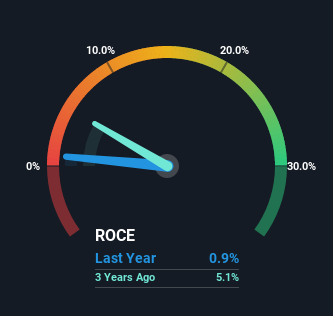Qinqin Foodstuffs Group (Cayman) (HKG:1583) Might Be Having Difficulty Using Its Capital Effectively

If we want to find a potential multi-bagger, often there are underlying trends that can provide clues. Typically, we'll want to notice a trend of growing return on capital employed (ROCE) and alongside that, an expanding base of capital employed. Basically this means that a company has profitable initiatives that it can continue to reinvest in, which is a trait of a compounding machine. However, after briefly looking over the numbers, we don't think Qinqin Foodstuffs Group (Cayman) (HKG:1583) has the makings of a multi-bagger going forward, but let's have a look at why that may be.
Return On Capital Employed (ROCE): What Is It?
For those who don't know, ROCE is a measure of a company's yearly pre-tax profit (its return), relative to the capital employed in the business. The formula for this calculation on Qinqin Foodstuffs Group (Cayman) is:
Return on Capital Employed = Earnings Before Interest and Tax (EBIT) ÷ (Total Assets - Current Liabilities)
0.0089 = CN¥13m ÷ (CN¥2.1b - CN¥627m) (Based on the trailing twelve months to December 2022).
Thus, Qinqin Foodstuffs Group (Cayman) has an ROCE of 0.9%. Ultimately, that's a low return and it under-performs the Food industry average of 9.7%.
See our latest analysis for Qinqin Foodstuffs Group (Cayman)

Historical performance is a great place to start when researching a stock so above you can see the gauge for Qinqin Foodstuffs Group (Cayman)'s ROCE against it's prior returns. If you're interested in investigating Qinqin Foodstuffs Group (Cayman)'s past further, check out this free graph of past earnings, revenue and cash flow.
What The Trend Of ROCE Can Tell Us
When we looked at the ROCE trend at Qinqin Foodstuffs Group (Cayman), we didn't gain much confidence. Around five years ago the returns on capital were 1.2%, but since then they've fallen to 0.9%. Although, given both revenue and the amount of assets employed in the business have increased, it could suggest the company is investing in growth, and the extra capital has led to a short-term reduction in ROCE. If these investments prove successful, this can bode very well for long term stock performance.
On a side note, Qinqin Foodstuffs Group (Cayman)'s current liabilities have increased over the last five years to 30% of total assets, effectively distorting the ROCE to some degree. If current liabilities hadn't increased as much as they did, the ROCE could actually be even lower. Keep an eye on this ratio, because the business could encounter some new risks if this metric gets too high.
Our Take On Qinqin Foodstuffs Group (Cayman)'s ROCE
Even though returns on capital have fallen in the short term, we find it promising that revenue and capital employed have both increased for Qinqin Foodstuffs Group (Cayman). And there could be an opportunity here if other metrics look good too, because the stock has declined 53% in the last five years. As a result, we'd recommend researching this stock further to uncover what other fundamentals of the business can show us.
If you want to continue researching Qinqin Foodstuffs Group (Cayman), you might be interested to know about the 1 warning sign that our analysis has discovered.
While Qinqin Foodstuffs Group (Cayman) may not currently earn the highest returns, we've compiled a list of companies that currently earn more than 25% return on equity. Check out this free list here.
Valuation is complex, but we're here to simplify it.
Discover if Qinqin Foodstuffs Group (Cayman) might be undervalued or overvalued with our detailed analysis, featuring fair value estimates, potential risks, dividends, insider trades, and its financial condition.
Access Free AnalysisHave feedback on this article? Concerned about the content? Get in touch with us directly. Alternatively, email editorial-team (at) simplywallst.com.
This article by Simply Wall St is general in nature. We provide commentary based on historical data and analyst forecasts only using an unbiased methodology and our articles are not intended to be financial advice. It does not constitute a recommendation to buy or sell any stock, and does not take account of your objectives, or your financial situation. We aim to bring you long-term focused analysis driven by fundamental data. Note that our analysis may not factor in the latest price-sensitive company announcements or qualitative material. Simply Wall St has no position in any stocks mentioned.
About SEHK:1583
Qinqin Foodstuffs Group (Cayman)
An investment holding company, engages in manufacturing, distributing, and selling food and snacks products in the People's Republic of China.
Excellent balance sheet and slightly overvalued.
Market Insights
Community Narratives



